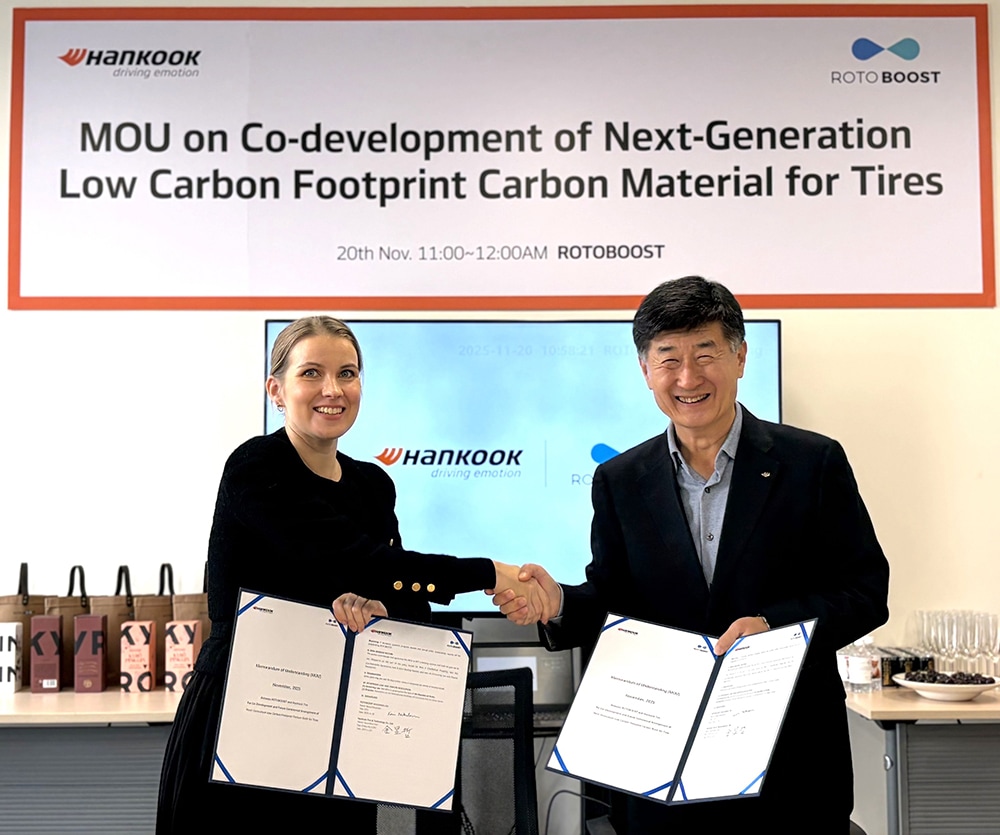Company
Hankook Tire Signs MOU with ROTOBOOST to Jointly Develop Turquoise Hydrogen-Based Carbon Materials
2025. 11. 21
- Joined hands on November 20 at ROTOBOOST China office in Shanghai to co-develop low-CO2 emission carbon material based on turquoise hydrogen
- Accelerating progress toward ‘2050 carbon neutrality’ by replacing conventional carbon black—a key tire material—with low-CO2 carbon material
- Contributing to the circular economy in the tire industry through global partnerships and the development of sustainable raw materials
Seoul, Korea, November 21, 2025 — Global leading tire company Hankook Tire & Technology (hereafter Hankook Tire) signed a Memorandum of Understanding (MOU) in Shanghai, China, with ROTOBOOST, a Finnish innovative company specializing in thermocatalytic decomposition of methane gas on November 20 to jointly develop a low-carbon footprint carbon material for tire applications, aligning with global net-zero emissions and circular economy sustainability goals.
Hankook Tire entered into this agreement with ROTOBOOST to collaboratively develop technologies aimed at reducing CO2 emissions during the raw material acquisition phase, supporting its long-term management strategy to achieve "2050 Net-Zero (greenhouse gas neutrality)." The signing ceremony was attended by Hyuncheol Kim, COO of Hankook Tire China, and ROTOBOOST CEO Kaisa Nikulainen, who reaffirmed their commitment to strengthening sustainable materials value chain.
One of the core materials used in tires, carbon black is a fossil-based feedstock raw material with high carbon dioxide emissions. To reduce CO2 emissions generated during tire manufacturing processes, Hankook Tire has been actively conducting research on the development of sustainable carbon black materials, including recycled carbon black and certified carbon black.
In particular, the “turquoise hydrogen carbon materials” to be jointly developed through this MOU is a carbon material manufactured during the process of producing hydrogen by decomposing methane gas in a high-temperature reactor. As a circular material that generates lower CO2 emissions, it has recently gained attention, especially within the automotive and tire industries, which require lower CO2 emissions.
Through this collaboration, Hankook Tire will pursue joint objectives that include optimizing the material properties of turquoise hydrogen–based carbon material, validating its performance in tire composite materials, and reducing greenhouse gas emission intensity by more than 50% without compromising product performance. In addition, the company plans to establish a quantitative verification framework based on Life Cycle Assessment (LCA) and Environmental Product Declaration (EPD) to transparently validate carbon-reduction effects across the entire lifecycle—ranging from raw material sourcing to manufacturing.
Hankook Tire is contributing to the establishment of a circular economy within the tire industry by accelerating the development of sustainable raw materials through strategic partnerships with major domestic and global institutions and companies. Prior to this MOU, the company began participating in May as a beneficiary company in the government-funded national research project on “large-scale turquoise hydrogen production technology,” and in January, it initiated a joint development project with Solvay Silica to produce circular silica using industrial waste sand and mine waste.
Last year, through the “Tire-to-Tire Circular Economy Model” consortium, the company successfully achieved its first mass production application of three ISCC PLUS–certified carbon blacks derived from pyrolysis oil made from end-of-life tires. Hankook Tire also commercialized the industry’s first chemically recycled PET tire cord in Korea by jointly developing the EV-dedicated “iON” tire with SK Chemicals and Hyosung Advanced Materials.
Hankook Tire plans to continue enhancing sustainability of the tire industry by reducing its dependence on petroleum resources, preventing the depletion of natural resources, and consistently lowering carbon emissions through strategic partnerships with global companies.









